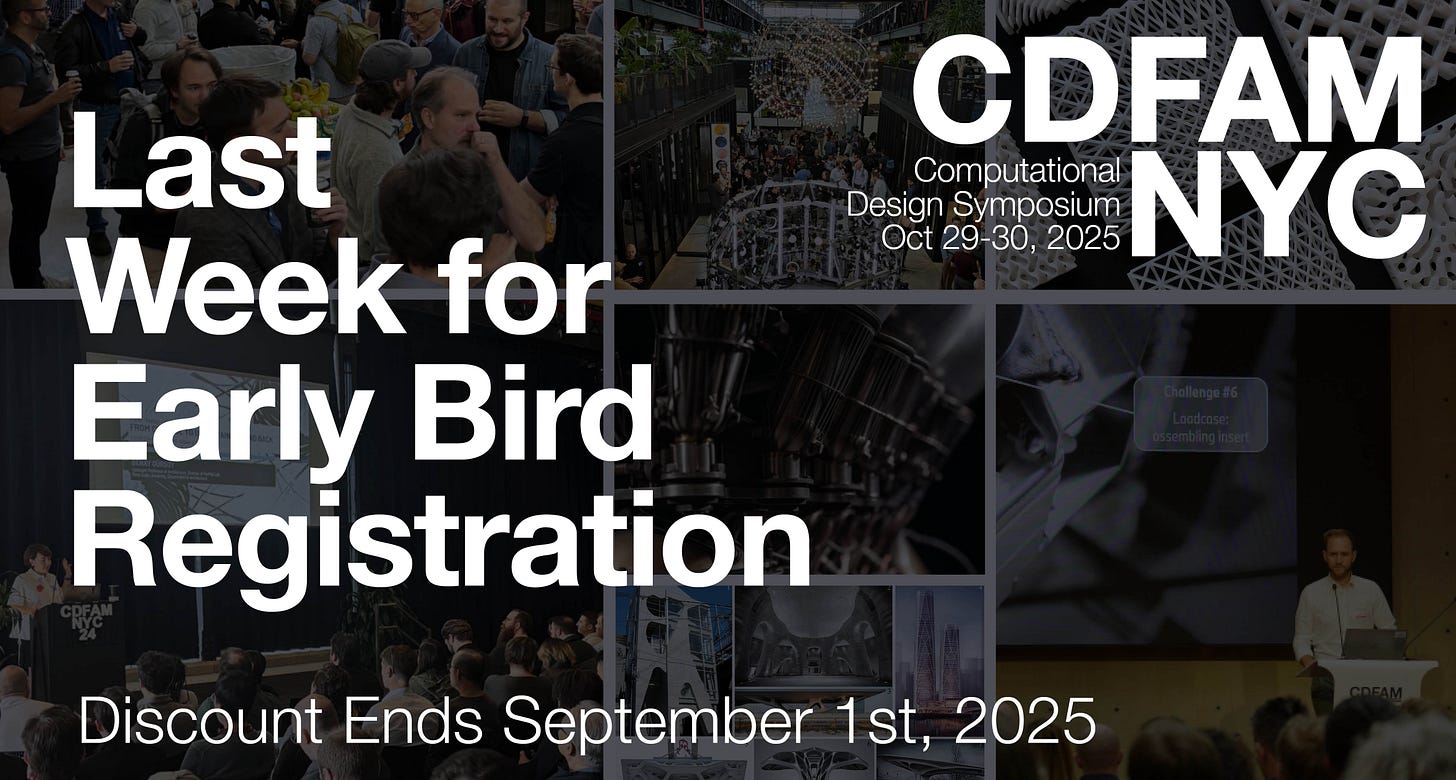Last Week for Early Bird Registration — CDFAM NYC 2025
Limited Discounts Available Now
This is the final week to secure early bird registration for the CDFAM Computational Design Symposium NYC 2025.
After this week, ticket prices increase, and space will be limited.
CDFAM brings together leading researchers, engineers, architects, and software developers who are shaping the future of computational design at every scale — from material systems and simulation to footwear design, structural engineering, and architectural systems.
Over two days, October 29–30, participants will hear directly from the people advancing design methods, tools, and applications across industries.
Who You’ll Hear From
This year’s symposium will feature two keynote presentations that frame the state and future of computational design.
Ian Pegler of NVIDIA will discuss the role of GPUs and AI in accelerating simulation and engineering workflows, providing a perspective from the forefront of high-performance computing.
Markus J. Buehler, McAfee Professor of Engineering at MIT, will explore “Superintelligence for Scientific Discovery in the Material World,” drawing on his pioneering work in AI-driven knowledge discovery for materials science, biology, and healthcare.
Together, these talks connect advances in hardware and computation with the broader implications of artificial intelligence for engineering and scientific innovation including a diverse set of perspectives from:
Samuel Whitworth (New Balance) – Exploring computational design in performance footwear.
Matthew Goldsberry & Junling Zhuang (HDR) – New models of computational authorship in architectural practice.
Austin Mitchell (Harman International) – Acoustic-Driven Computational Design: Premium Branded Audio In The Automotive Industry
Luca Zampieri (Neural Concept) - Empowering Organizations with Engineering Intelligence to Revolutionize Product Development
Will Samosir (VARIANT3D) – The future of digital manufacturing in textiles and footwear.
Andrew Sink (Carbon) – On scaling design and additive manufacturing production workflows for consumer facing products.
Chris McComb (Carnegie Mellon University) – On AI and the shifting role of the designer.
Gustav Fagerström (Walter P Moore) – Using Computational Design To Manage Compound Tolerances Of Multiple Materials To Create The World‘s Largest Double Curved Outdoor LED Screen
Tuo Zhao - (Princeton University) - Super-Modular Chiral Origami Metamaterials
Bradley Rothenberg (nTop) – Software-driven innovation for design and manufacturing.
Sergey Pigach (CORE studio / Thornton Tomasetti) – Computational design for complex structures.
Marco Pietropaoli (ToffeeX) – Design You Can Trust: Explainability and Control in Physics-Driven Generative Design
David Burpee - Computational Morphogenesis: Leveraging Proceduralism to Unlock Temporal Design
…and many more from leading organizations including Arup, Foster + Partners, Scawo3D, Novineer, Intact Solutions, Alloyed, and PhysicsX.
Why Attend
Two full days of presentations and discussion.
Networking opportunities with peers working at the forefront of computational design in academia, industry, and software.
Interdisciplinary exchange across scales and disciplines, from material innovation to mega-structures.
Direct insight from the people building the tools and leading the projects that are reshaping design practice.
Don’t Miss Out
The early bird deadline is this week. After that, ticket prices increase, and space will be limited.
If you plan to attend, now is the time to register:
Join us in New York City this October and be part of the discussion on the future of computational design, machine learning and AI for engineering and architecture.


